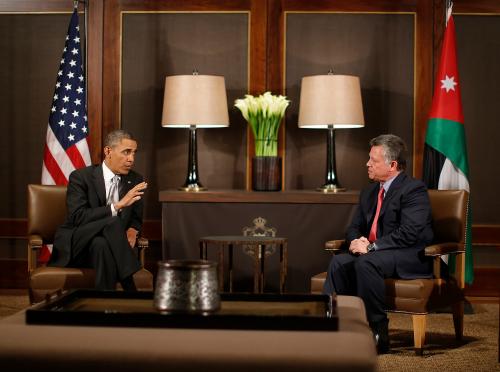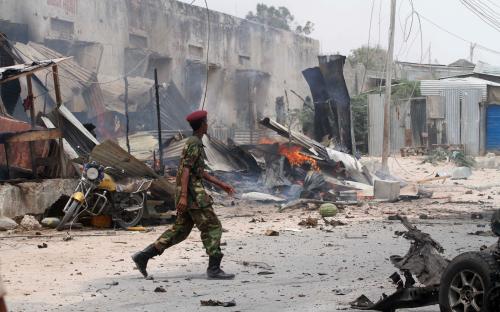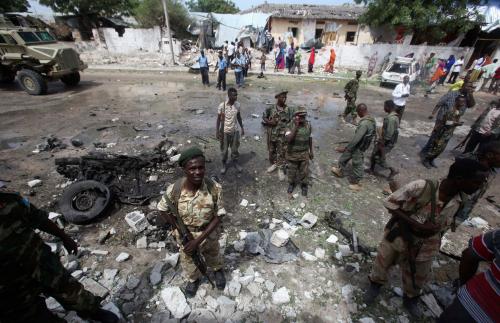Bruce Riedel reviews The Duel, by Tariq Ali.
Pakistan is the most dangerous country in the world. No other country poses the issues of al-Qaeda, terrorism, nuclear proliferation, nuclear war and peace, drugs, democracy, military dictatorship and Islam in such a volatile and combustible way. If there is another 9/11-like attack on the United States, the postmark almost certainly will be Pakistan.
Yet most Americans don’t realize how much of the Pakistani peril is our own fault. “The Duel” will anger many in this country but should be read for an understanding of, first, what role America has played in creating this dangerous mix and, second, why many Pakistanis see us as responsible for their problems.
Tariq Ali, a Pakistani intellectual who lives in London, has written for decades about the plight of his country, predicting many of its calamities and pointing to a U.S. hand in them. He correctly forecast the civil war that led to Bangladesh’s secession from Pakistan, which came despite the Nixon administration’s vigorous support for Pakistan’s violent attempt to suppress the Bengali independence movement. An inveterate critic of U.S. policy ever since the Vietnam era, Ali may have inspired the Rolling Stones song “Street Fighting Man,” which Mick Jagger is said to have written after attending an antiwar rally in London in 1968.
Ali rightly notes that the United States has consistently chosen to back Pakistan’s military dictators when they seized power from elected governments. Eisenhower and Kennedy backed the first dictator, Ayub Khan; JFK even gave him a state dinner at Mount Vernon and took him to Newport, R.I. Nixon famously tilted toward Yahya Khan during Pakistan’s brutal attempt to crush Bangladesh. Carter and Reagan backed Mohammad Zia-ul-Haq to help defeat the Soviets in Afghanistan, inadvertently giving birth to the modern jihadist movement. And George W. Bush backed Pervez Musharraf in return for help fighting al-Qaeda, even though the general perverted election after election to stay in power. Blind U.S. support for these military strongmen has eroded Pakistan’s civil institutions and rule of law, along with America’s claim to support freedom and democracy in the Islamic world.
But Ali goes even further, saying Pakistan is nothing but an American “satrapy.” He is undoubtedly right that Pakistanis have lost faith in the United States as an ally; recent polls show that fewer than 10 percent have positive feelings toward America, an all-time low. The Pakistani press is full of articles about Washington’s alleged plans to seize Pakistan’s nuclear arsenal or to invade and divide the country in collusion with India. Such conspiracy theories are rampant even in the officer corps.
By Ali’s account, virtually every institution of the U.S. foreign policy elite has been complicit in Pakistan’s problems. My employers of the past three decades, the CIA and the Brookings Institution, get their share of blame. So do both of the current presidential candidates: Barack Obama for pledging to strike al-Qaeda targets in Pakistan unilaterally if Pakistan won’t help, and John McCain for backing Bush’s unquestioning support for Musharraf. Ali is equally critical of Pakistan’s civilian politicians who, in his view, have misruled and robbed the country for their own gain during intervals between the generals. Even the late Prime Minister Benazir Bhutto receives harsh criticism for her tolerance of corruption and her dynastic ambitions.
“The Duel” makes useful policy suggestions, including land reform to break the hold of feudal dynasties such as the Bhuttos and the creation of a South Asia Union, akin to the European Union, to build a strong trading bloc and ease Indo-Pakistani tensions. But the author underestimates al-Qaeda, both in the danger it poses to Pakistan and in the importance it plays in American minds. He is right that Pakistan’s Islamist political parties are unlikely to gain power through the ballot box; they lost many seats in February’s election, which was probably the most legitimate in the country’s history. But all Pakistanis should take much more seriously the threat that terrorists will produce another world-changing event from a sanctuary in Pakistan, for the consequences could well be dire.
Whoever wins the U.S. presidential election will have to deal with the volatile mix that is today’s Pakistan. “The Duel” makes a strong case that the United States should back Pakistan’s civilian leadership, flawed as it is, in an effort to build a modern Islamic democracy. That will require much more economic aid, creative diplomacy to ease tensions with Afghanistan and India, straight talk about ending Pakistan’s ties to terrorism, and patience. It will take time to recover from the Bush-Musharraf legacy, but we cannot afford a failed state in Pakistan, especially one that bears the label Made in the U.S.A.



Commentary
Pakistan: Foreign Policy Past Its Expiration Date
September 9, 2008